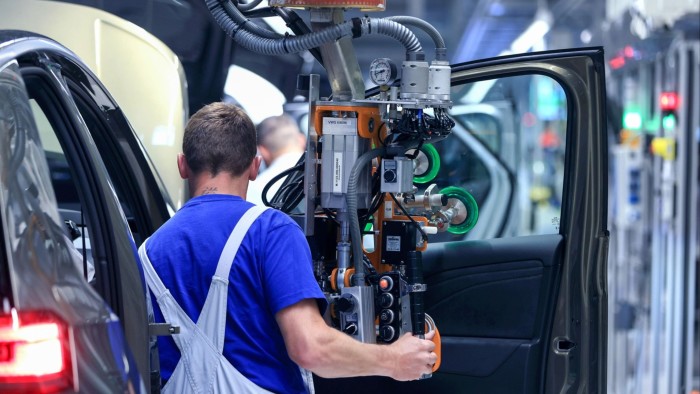Merz plans €46bn corporate tax breaks to revive German economy

Stay informed with free updates
Simply sign up to the German economy myFT Digest — delivered directly to your inbox.
Germany’s new government will seek to pass a €46bn package of corporate tax breaks over the summer in an effort to jolt the Eurozone’s largest economy out of stagnation.
Finance minister Lars Klingbeil, a Social Democrat, will outline the measures during a cabinet meeting on Wednesday. The tax incentives, which include deductions for new equipment and new electric vehicles, will cost about €46bn in total by 2029, when the coalition’s term expires, according to government estimates seen by the Financial Times.
“Following a period of economic stagnation, it is important to raise the potential of the German economy significantly,” reads the draft bill. The measures are meant to “send a strong signal for the short-term and long-term competitiveness of Germany as a business location.”
The initiatives come in addition to a massive debt-funded public spending plan of more than €1tn to modernise Germany’s armed forces and ageing infrastructure — the central plank of Chancellor Friedrich Merz’s efforts to revive the economy.
The leader of the Christian Democrats, who campaigned on a pro-business platform, has also vowed to subsidise electricity costs for the country’s struggling manufacturing industry. A ministry has been created to slash bureaucracy and speed up digitisation of the administration.
The planned tax breaks would be “good for Germany as a place to invest”, said Holger Schmieding, chief economist at Berenberg. “But this can only be the start. Easing the regulatory burden will be more difficult but also more important.”
From July 1, companies would be able to deduct 30 per cent of the cost of new machinery and other equipment from their tax bill annually between 2025 and 2027.
From 2028, the federal corporate tax rate of 15 per cent would then decrease by one point each year to 10 per cent. Companies will also be allowed to depreciate 75 per cent of the purchase price of new electric vehicles on year one, and thus reduce their taxable income. The government intends to introduce more advantageous tax incentives for R&D spending.
Robin Winkler, head of German macro at Deutsche Bank, said the proposals should provide a “welcome short-term stimulus for the manufacturing sector”.
Merz’s coalition with the Social Democrats expects the measures to be adopted by the two houses of parliament by the end of the summer.
Merz’s economic plan signals a policy shift for a country that, not long ago, stood as the EU’s standard-bearer for fiscal discipline.
The export-oriented nation — already struggling with Chinese competition and higher energy costs — has seen minimal growth over the past three years. Economists warn that renewed threats of 50 per cent US tariffs on European goods could push the economy into contraction this year.
In the third quarter of 2024, Germany’s corporate investments in plant, machinery and vehicles were 9 per cent below the pre-pandemic level, according to German development bank KFW.
They were 11.5 per cent higher in the US and 1 per cent higher in the EU as a whole in the same period.
Public and private R&D expenditures were also lower than in other countries: while Germany spent 11 per cent more in intellectual property than before the Covid-19 pandemic, the US spent 36 per cent more and France 27 per cent more in areas such as AI, according to KFW.




